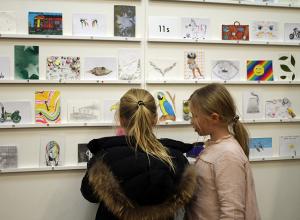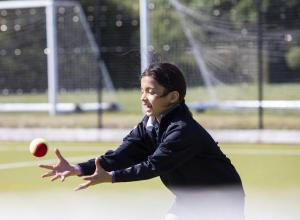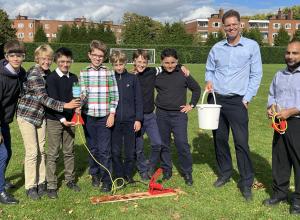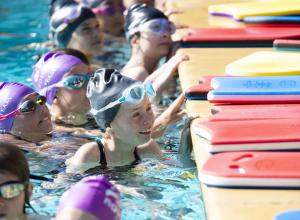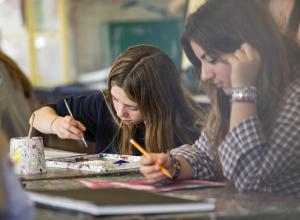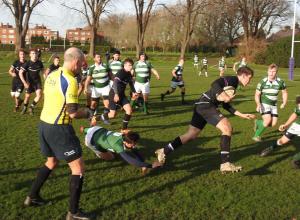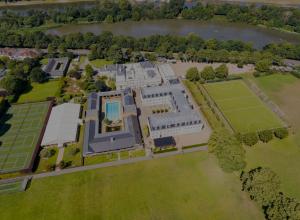
Deputy Head of the Senior School Andy Woodward reflects on the importance of self-care and why it is essential our students, particularly those sitting examinations, rest and take helpful breaks.
Are We Bad At Resting?
‘And rest is important too!’
This is one of those staple phrases that graces every end-of-term assembly in the Senior School. At times it sounds rather hollow – deployed along the lines of “Make sure you’re revising every day! The exams are sooner than you think! (oh and mumble mumble rest is important too…)”. But for the most part, we mean it, whether or not the kids believe us. Our pupils experience academic pressure, want very much to succeed, feel stressed about the demands of the season, and often need to be convinced that, honestly, rest is important too! Important for wellbeing. Important for balance in life and making the most of their fleeting youth. Important for revision and optimal academic performance - ie for a mind that is actually clear and, well, rested enough to learn and perform.
Sometimes we do mean whole days off – time spent not thinking about school or work AT ALL. There is always a place for those. But, for the other days – particularly when an exam season approaches – it is those shorter moments of rest that become important.
A raft of studies show the positive role played by breaks from work, and the negative impact that fatigue can wage on concentration and motivation levels if they’re neglected. Indeed, any teacher of teens knows well the significant difference between teaching a class early in the day, as opposed to immediately before lunchtime, by which time the same cherubs will have morphed into one surly, barely-sentient, collective shrug. We can now put specifics on what’s required to improve things. A study published by Desktime, a productivity tracking app, found the optimal sweet spot to be a 17-minute break after every 52 minutes of work! Rather less exacting, but increasingly recommended by many universities, is the Pomodoro Technique of taking 5 minutes off every 25-minutes, with a 30 minute break after four such cycles – a schedule sadly unrealistic for the school timetable, but generally achievable at home.

But, whenever it is that the time for a break arrives, do we actually know what to do with it? Rest is not merely synonymous with ‘not working’… nor necessarily with leisure, or extra sleep. Rest should be restorative, refreshing, beneficial. And, as a society, we’ve become rather bad at that.
It is clear that for many young (and less young) people, ‘rest’ means in practice time on their mobile device – urgently catching up and engaging with their favoured social media, streaming or gaming platforms. Now this can perhaps be restful… It can be fun, sociable, rewarding or informative. It can serve the purpose played in previous generations by the TV or stereo. Our phone can make us laugh uproariously, connect us with friends, or show us all the calming sunsets and oceans of the world. And that’s before we even mention animal cams.
But… we probably know too the feeling of self-reproach that comes with realising that the time in which we could have gone outside, rested our eyes, read that book or caught up with a friend was instead spent scrolling endlessly, mindlessly, though Instagram or TikTok feeds as the minutes subsided; often comparing ourselves negatively to others as we did so.
All those short clips, unfinished bursts of music, attention-seeking snippets… Were they restful? Did we feel refreshed afterwards? More likely, our eyes felt tired, our inner self felt agitated. This – the small and fast-moving screen – does not tend to give rest to our brain. One study by the Neuroleadership Institute in 2012 found that the relentless dopamine hits generated by social media created ‘brain hyperactivity’ which made it hard to settle and focus again straight afterwards. And that was in the era of Facebook… how much more so in the TikTok age?!
Now this all sounds terribly unfair. I have regularly told pupils to put away their phones while studying at home, and then to treat them as a reward in between tasks. Are they not even allowed that? Well, in truth I think it’s only fair that they allow themselves times to access their notifications and quell that nagging sense of FOMO. But they also need to know; not all breaks are equally beneficial. And this is not the rest we speak of!
A helpful break generally consists of doing what is different. If revision is spent onscreen, then rest from this is found offscreen. If the day is spent trapped indoors, rest is found outdoors. If the environment is quiet, it’s time to make some noise. If the environment is solitary, then it’s time to find a person to speak to. Rest should be a change. Rest should be enjoyable. And rest should be intentional – it is worth first taking 30 seconds to perceive what kind of break is required and to plan how to achieve it.

And what about sleep? There are those who swear by naps – particularly when dressed up as that exec feature, the ‘power nap’. Different views exist here... but in fact it’s not always a good idea. The best gift to give the teenage brain is a regular, routine-bound sleep cycle of 8-10 hours per night. Time spent napping beyond this is likely to confuse matters and get in the way of night time rest. Better to just sit still or meditate. Or, for that matter, to run around and dance like a maniac. Whatever works!
To conclude then: yes, rest is important too. We’ll keep saying it. But we need to get better at then adding something else about what beneficial rest looks like, and how youngsters can truly give their brain some all-important time off amidst all the pressure of exams etc. And if some of our pupils could eventually attain the holy grail of a healthy work/rest balance… well, then they really would have learned something of enduring and lifelong value.
Right, blog written. I’m off outside for an intentional 5-minute lap of the school field…

